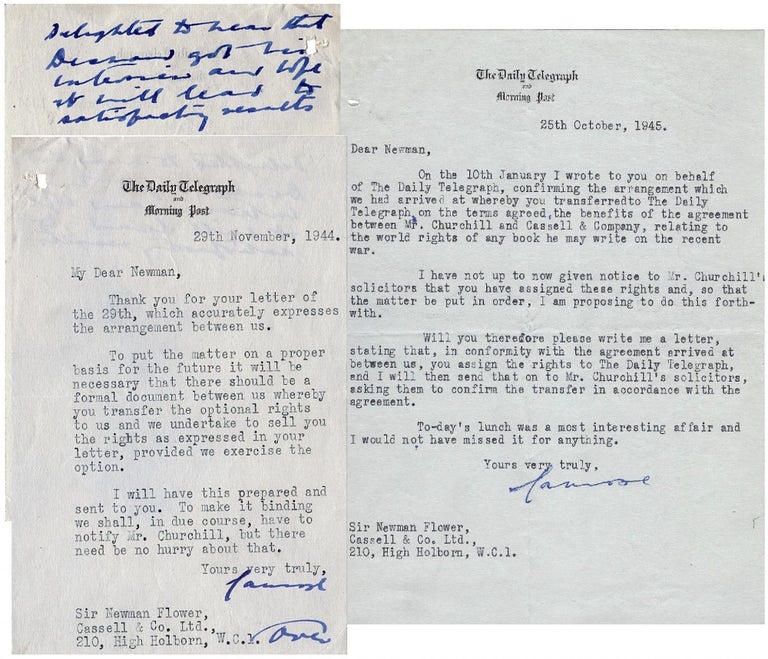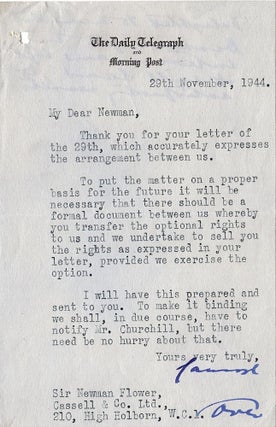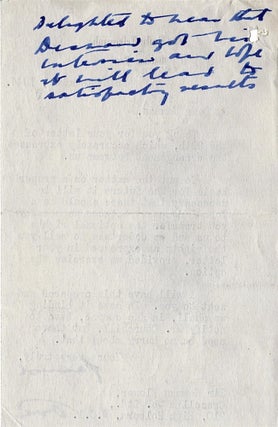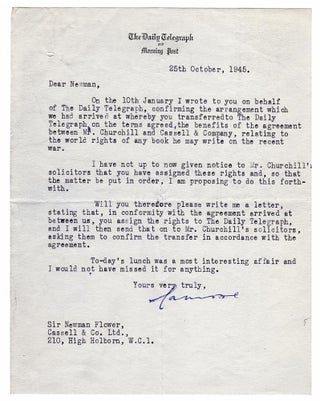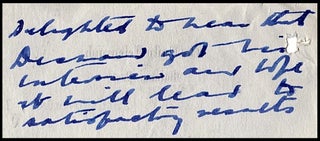Two typed, signed letters dated 29 November 1944 and 25 October 1945 from Lord Camrose to Sir Walter Newman Flower regarding "the greatest coup of twentieth century publishing" - the rights to publish Winston S. Churchill's eventual history of the Second World War
Letter. These two typed, signed letters from newspaper publisher Lord Camrose to Sir Newman Flower of Cassell and Company Limited concern what has been has been called “perhaps the greatest coup of twentieth century publishing.” The letters were acquired as part of a small archive regarding Churchill’s publishing history with Cassell and follow the initial arrangement with Churchill, in the final year of the war, to publish what became The Second World War. Churchill’s six-volume history, eventually published between 1948 and 1954, made the fortunes of both the author and his publisher.
Both letters are typed on “The Daily Telegraph and Morning Post” stationery. The first is dated “29th November, 1944”, just four days after Churchill’s initial publication commitment to Cassell. In his letter to Flower, Camrose refers to “the arrangement between us” (for world and serial versus British book publication rights) and references need for “a formal document between us...” Likely sensitive to Churchill’s caveats and equivocation, Camrose concludes: “To make it binding we shall, in due course, have to notify Mr. Churchill, but there need be no hurry about it.” Camrose’s blue ink holograph note on the verso reads: “Delighted to hear that Desmond got his interview and hope it will lead to satisfactory results.”
Then serving in the Army, Newman’s son Desmond landed in Normandy and won the MC in Operation Bluecoat in August 1944, returning to Cassell in 1946. The second letter from Camrose to Flower is dated “25th October, 1945.” and clarifies that “world rights of any book he [Churchill] may write about the recent war” were transferred by Cassell to Camrose’s Daily Telegraph. Intriguingly, this was worked out between Camrose and Flower without engaging Churchill’s lawyers; Camrose asks for a letter from Flower confirming assignation of the world rights so that Camrose may “then send that on to Mr. Churchill’s solicitors, asking them to confirm the transfer…” Both letters are in fine condition, each with a single hole at the upper left consonant with original filing.
Churchill’s close friend, British newspaper publisher William Ewart Berry, 1st Viscount Camrose (1879-1954) owned (with his brother, Lord Kemsley) the Daily Telegraph and Morning Post. Sir Walter Newman Flower (1879-1964) purchased the book-publishing part of Cassell in 1927 from Camrose and Kemsley. As early as 1939 – before he was even Prime Minister - Churchill had already been courted by publishers for the enticingly lucrative rights to publish any post-war memoirs. Cassell ultimately won the prize.
At a wartime dinner, Churchill “informally promised Camrose the newspaper rights in Britain and the Empire to any war memoirs” he might write. Sir Newman’s moment came when Churchill was offered a large sum for the film rights to the yet-unpublished History of the English-Speaking Peoples. Cassell owned the rights, which Flower offered to surrender in return for first refusal on Churchill’s anticipated war memoirs. On 24 November 1944 Churchill consented, writing to Flower: “I shall be very pleased to give your firm a first refusal, at the lowest price I am prepared to accept, of publishing rights in serial and book form… in any work I may write on the present War after it is over.” Churchill specified “I undertake no obligation to write anything.”
The caveats reflected the author’s ruthlessly hard-nosed approach to extracting value for his writing. Nonetheless, the agreement set the stage for Cassell’s publishing triumph. Of course Churchill wrote his war memoirs and Cassell did what it took to accommodate Churchill’s expectations. Churchill’s six-volume work not only ensured his own financial security, but also proved the essential asset to Cassell’s postwar recovery. In late 1946, Camrose represented Churchill (along with Emery Reves) in negotiating the deals with American publishers, ultimately concluding “the most successful publishing venture of all time.”. Item #003763
Price: $850.00

